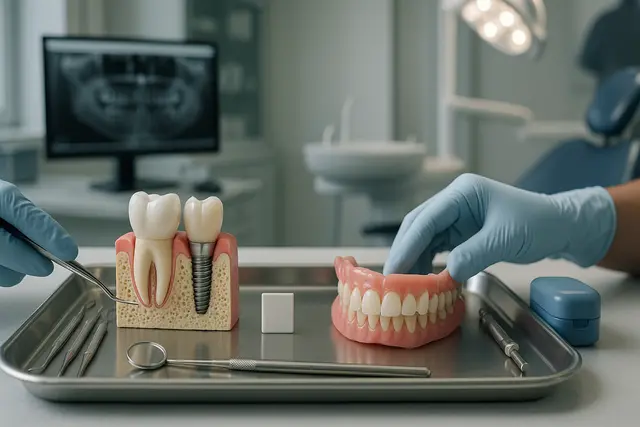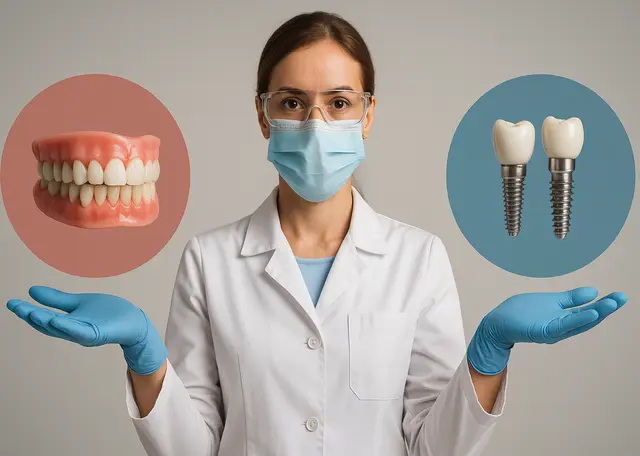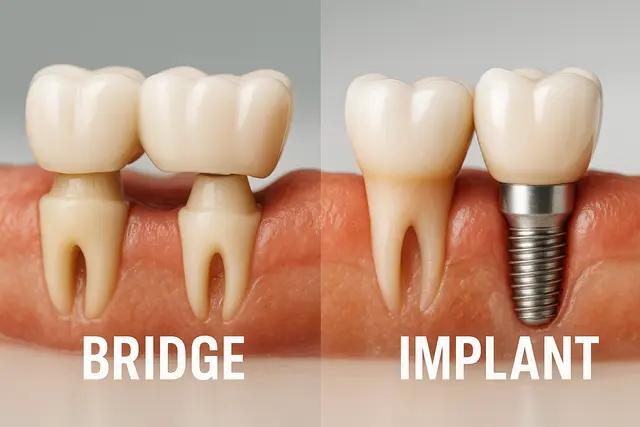Prosthodontics
6 min read
Oct 16, 2025
Dental Implants vs. False Teeth Comparison: A Side-by-Side Look at Options
Losing teeth can be a life-changing experience, affecting everything from your smile to how you eat and speak. Fortunately, modern dentistry offers reliable solutions to restore both function and confidence. This article explores the key differences between dental implants and false teeth, helping you understand which option might suit your needs best.

Let’s be honest: losing your teeth is no picnic. Whether it's one or several, missing teeth can make everyday things like eating, smiling, and talking a little less joyful. The good news? There are solid options out there. And no, it’s not just your grandma’s full denture anymore. Today, you get to choose between traditional dentures and dental implants, and yes, there’s a big difference.
This guide breaks down the real-world pros and cons of each, with a side-by-side comparison that actually makes sense. So if you’re stuck choosing the right tooth replacement, keep reading.
Denture Choices That Fit Different Needs
Dentures are false teeth. But don’t let the phrase scare you off. Modern dentures are much more natural-looking and functional than the ones you might be picturing in a glass on a nightstand.
There are many types of dentures, including complete dentures, partial dentures, and implant-supported dentures. Whether you’ve lost all your teeth or just a few, there’s a denture to match.
A full denture is exactly what it sounds like: a complete set of prosthetic teeth for the upper, lower, or both jaws.
Partial dentures are used when some natural teeth are still holding their ground.
And if you're going for something sturdier, implant-supported dentures offer more stability because they’re anchored to dental implants.
What to Know About Getting a Dental Implant
A dental implant may sound high-tech, and it kind of is. But it's also incredibly effective. A dental implant is a small titanium post that acts like a tooth root. It’s inserted into the jawbone, then topped with a dental crown. The result? Teeth that look and feel like natural teeth.
The dental implant procedure takes time, usually a few months from start to finish. But many patients find the wait is worth it. Implants are designed to last decades, sometimes even a lifetime. And unlike dentures, they don’t shift, click, or need to be removed nightly.
The Pros and Cons of Dentures
Dentures are used to replace missing teeth, especially when multiple or all teeth are gone. They’re popular for good reasons: they're more affordable upfront and often covered by insurance. Getting dentures is also less invasive, no surgery needed.
But dentures are removable dental appliances, and that comes with downsides. Dentures may slip while eating or talking. They can cause sore spots on your gums. And you’ll need to remove and clean them daily.
Another thing: dentures are made from materials that sit on top of the gums, which means they don’t stimulate the jawbone like a dental implant does. Over time, that can lead to bone loss.
Implants Offer a More Permanent Solution
If you're after something that behaves like your original teeth, implants offer a more permanent and natural option. Dental implants are artificial, but they’re rooted in your jaw just like real teeth.
The benefits of implants go beyond appearance. They help maintain the structure of your face, prevent bone loss, and allow you to chew and speak without worry. A single tooth or a full arch can be replaced with implants.
Yes, implants cost more upfront. But dental implants can last decades, some even for life, if you take care of them. Compared to replacing a set of dentures every 5 to 10 years, the investment may balance out.
Compare Dentures vs Implants by Cost, Feel, and Function
When it comes to the cost of dentures vs implants, dentures win the price game upfront. A set of dentures may run a few hundred to a couple thousand dollars. The cost of dental implants can vary widely, but a single implant may range from $3,000 to $6,000.
But hold on: implants are designed to last. Dentures? Not so much. Plus, implants offer better chewing strength and feel more like natural teeth. Dentures often require adhesives, while implants stay put.
The Difference Between Dentures and Dental Implants You Should Know
Let’s break down the difference between dentures and dental implants in one quick chart:
Feature | Denture | Dental Implant |
Lifespan | 5-10 years | 20+ years or lifetime |
Stability | May slip or move | Securely anchored |
Feel | Less like natural teeth | Very close to natural teeth |
Maintenance | Daily removal and cleaning | Brush and floss like natural teeth |
Jawbone Health | Doesn’t prevent bone loss | Stimulates bone and prevents loss |
Cost | Lower upfront | Higher upfront, longer-lasting |
Choosing Between Dentures and Dental Implants: Which Is Better for You?
Here's where it gets personal. Choosing between dentures and dental implants depends on your lifestyle, health, and budget.
If you want the closest thing to natural teeth, choose dental implants. If you want a budget-friendly fix and don’t mind a removable denture, dentures may be more suitable.
Still unsure? A good dentist’s comparison guide can help weigh your specific situation. If you have healthy gums and enough bone, you might be a good candidate for implants. If not, a partial denture or full denture could work just fine.
Dentures and Dental Implants for Tooth Loss
Tooth loss can happen from injury, decay, or illness. But no matter the cause, you deserve a solution that makes you feel whole again.
Dentures and implants both aim to restore function and confidence. Dentures are often used when many or all teeth are missing. Implants can be used for everything from a single tooth to a full mouth restoration.
Some people even combine both options, using implant-supported dentures to get the best of both worlds.
What Type of Dental Patient Benefits Most From Implants
Implants aren’t for everyone. Implants require healthy gums and enough bone density to support the post. They also demand commitment, both financially and in terms of healing time.
If you smoke, have diabetes, or struggle with oral hygiene, you might not be a good candidate for implants right now. But don’t lose hope. Some patients become eligible after bone grafting or other prep work.
Dentures Are Removable, but That’s Not Always a Bad Thing
Sure, dentures are removable dental appliances, but that can actually be helpful. They’re easy to clean, and adjustments are simpler. Plus, traditional removable dentures are a less invasive option for older adults or those with medical issues.
Just remember: dentures are typically less stable than implants. They rest on the gums and need regular relining or replacement.
Tooth Replacement Option That Feels Like Natural Teeth
If you’re dreaming of teeth that feel like natural teeth, implants win. Dental implants look and feel like natural teeth. They’re strong, they don’t budge, and they blend in beautifully with your existing teeth.
Whether it's for one missing tooth or several, an implant may offer the comfort and confidence you want.
Dentures and Implants Working Together
Why choose one when you can have both? Implant-supported dentures offer the look of a denture with the security of implants. They're especially helpful for people who want the coverage of a full denture but without the slipping and sliding.
Implant-supported dentures are attached to dental implants or anchored to dental implants, giving you a snug fit that feels closer to real teeth.
Cost of Dentures vs Long-Term Implant Value
Let’s talk numbers. The cost of dentures is generally much lower than implants. But here’s the catch: they need to be replaced more often, and maintenance costs can add up.
Dental implant financing can help ease the initial burden. Over time, they may actually save you money compared to repeated denture fittings.
Choosing the Right Tooth Replacement Option With Help From the Experts
The decision between dentures and dental implants isn’t just about teeth. It’s about how you want to live. Whether you're looking to replace missing teeth in just one area or overhaul your smile, talking with a trusted dental provider matters.
A qualified team can walk you through the dental implant procedure, help you compare dentures vs implants, and explain the pros and cons of dentures versus other treatments like a dental bridge.
Your Right Choice for Your Dental Health Starts Here
You shouldn’t have to compromise on comfort or confidence. Whether you go with dentures or implants, the goal is the same: to help you feel more like you again.
Implants can last a lifetime. Dentures are more affordable. Partial dentures replace some teeth, complete sets cover everything. Implants are fixed, dentures are removable. But both are real solutions to real problems.
Dentures are designed for ease. Implants are designed to last. You just have to find what fits your life best. And if you’re not sure? That’s what we’re here for.
What Is the Main Difference Between Dentures and Dental Implants?
The main difference lies in how they’re secured and how they feel. Dentures are removable appliances that rest on the gums, while dental implants are surgically placed into the jawbone and function like natural tooth roots. Implants offer greater stability, prevent bone loss, and feel more like natural teeth, whereas dentures are more affordable upfront but may shift or require adhesives.
Are Dental Implants Really Worth the Higher Cost?
Yes, for many patients, dental implants are worth the investment. While implants cost more initially, they often last 20 years or more with proper care, unlike dentures that need replacing every 5–10 years. Implants also help maintain jawbone health, improve chewing strength, and offer a permanent solution that looks and feels natural, potentially saving money in the long run.
Who Is a Better Candidate for Dentures?
Dentures may be better suited for individuals with significant tooth loss, limited jawbone density, or those looking for a budget-friendly, non-surgical option. They’re also a good choice for patients with medical conditions that make surgery risky. Dentures come in full or partial versions and can be customized for comfort, though they do require regular maintenance and adjustment.
Can You Combine Dentures and Implants?
Absolutely. Implant-supported dentures combine the full-arch coverage of dentures with the stability of dental implants. They’re ideal for patients who want a more secure fit without replacing every single tooth with an implant. This hybrid option improves comfort, chewing ability, and confidence while reducing the common issues of slipping or clicking that come with traditional dentures.
Read Next
Related Posts

Prosthodontics
Implant vs. Dentures Pros and Cons: A Deep Dive into Modern Solutions
Missing teeth can impact more than just your smile, they can affect how you eat, speak, and feel about yourself. Fortunately, modern dentistry offers two leading solutions to bring back both function and confidence: dentures and dental implants. Understanding the pros and cons of each can help you make the choice that fits your needs, lifestyle, and budget.
7 min read
Oct 17, 2025

Prosthodontics
Full Mouth Implants vs. Dentures: Which Is Better for You?
When it comes to replacing missing teeth, the choice between full mouth dental implants and dentures can be overwhelming. Each option has its own set of benefits, limitations, and long-term considerations, making it essential to understand what works best for your needs, health, and lifestyle.
5 min read
Oct 17, 2025

Prosthodontics
Tooth-Supported Bridge vs. Implant Comparison: Benefits, Drawbacks, and Insights
Deciding between a dental bridge and a dental implant can feel overwhelming, especially when both options promise to restore your smile and improve oral function. Each solution comes with its own set of benefits, considerations, and ideal use cases, making it essential to understand how they compare before choosing what’s right for you.
6 min read
Oct 17, 2025
Don’t have time to research every dentist around you?
See why 30k+ patients trusted us